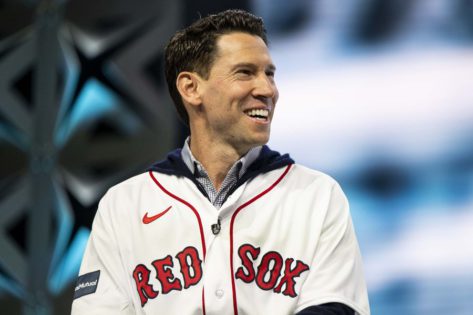When fans started doxing your Chief Baseball Officer, you knew your franchise had hit rock bottom. That’s exactly where the Boston Red Sox find themselves after the trade of Rafael Devers. What began as organizational optimism has devolved into a five-game losing streak, a 40-43 record.
The Devers trade wasn’t just a roster transaction—it was the moment Craig Breslow‘s front office credibility imploded. With approximately 50 staff members reportedly alienated by his analytics-heavy approach and fans hunting down his personal information, the Red Sox have managed to accomplish something remarkable: Making their dysfunction more compelling than their game. Now, as the trade deadline looms, the organization faces a brutal reality check.
Red Sox Chief Baseball Officer Craig Breslow remains steadfast despite evidence against his strategy, stating that the team remains committed to competing in 2025. Even after a loss to the Angels, Breslow reiterated that the team is “as committed as we were six months ago to putting a winning team on the field.”
Meanwhile, former MLB GM Dan O’Dowd, who built the Colorado Rockies’ 2007 National League pennant team during his 15-year tenure, has delivered a scathing criticism of Breslow’s approach. O’Dowd argues that Breslow “acts like a lot of current General Managers, which is that players are part of a portfolio that they buy and sell.”
This transactional mindset has become endemic across modern front offices. Consider how the Padres shuffled Juan Soto despite his MVP-caliber performance. Today’s GMs treat star players like stock options—valuable assets to be leveraged for maximum organizational return rather than foundational pieces deserving loyalty.
But O’Dowd believes Breslow, as a former player, should operate differently. During Breslow’s playing career from 2005 to 2011, the baseball landscape prioritized relationships and player development over pure analytics. Veterans like Derek Jeter spent their entire career with one organization, and trades involving franchise cornerstones were rare, earth-shaking events. Breslow pitched in an era where David Ortiz’s Red Sox loyalty was reciprocated with a lifetime commitment, not a spreadsheet calculation.
“If they had flown to the Dominican Republic, and they had looked him (Devers) in the eyes and said, ‘Listen, you’re not a real good defender. We got a chance to sign Bregman or trade for Arenado. We’re going to do that. So, let’s talk about what the transition is for you,” O’Dowd explained further on the matter.
Dan O’Dowd says Craig Breslow doesn’t act like a former player.
“He acts like a lot of current GMs, in that players are a part of a portfolio that they buy and sell.” pic.twitter.com/CQ0kuTcysd
— Foul Territory (@FoulTerritoryTV) June 26, 2025
And Devers’ trade couldn’t have come at a worse time—Boston had won eight of their past 10 games when they traded their best hitter, including five crucial victories against the division-leading Yankees. Since Devers’ departure, the Red Sox have stumbled to a five-game losing streak, validating critics who questioned the decision to sell during a hot streak.
Now, O’Dowd also believes the Red Sox should be sellers at the trade deadline, stating, “the sum of their parts does not equal the bigger part.” This assessment cuts to the heart of Boston’s fundamental problem—they’re chasing playoff dreams with a roster that lacks the cohesive talent necessary for postseason success.
Why the Red Sox should embrace seller status
With a 16.6% playoff probability, the Red Sox roster construction reveals fundamental flaws that no mid-season additions can solve. Boston’s core issues extend beyond Devers’ absence and expose why O’Dowd’s “sum of their parts” criticism rings true.
Their starting rotation lacks depth beyond Garrett Crochet, their bullpen remains inconsistent, and their lineup strikes out at alarming rates—766 times since April, ranking third-worst in MLB. Young prospects like Marcelo Mayer show promise but aren’t ready for immediate impact. Veterans like Trevor Story provide steady production but lack the star power necessary for postseason contention.
Rather than chasing marginal upgrades that won’t address systemic problems, Boston should maximize their tradeable assets. Players like Kenley Jansen, Tyler O’Neill, and Nick Pivetta could return meaningful prospects while the market values veteran contributors. The Red Sox front office’s reluctance to accept reality only delays inevitable roster reconstruction.
Devers’ absence has created a leadership and production vacuum that patchwork solutions cannot fill. The All-Star’s departure removed not just their most consistent bat, but their emotional anchor during adversity. With Alex Bregman still on the IL, Boston lacks a veteran presence to guide them through slumps that would have been manageable with their former cornerstone.
The psychological impact extends beyond statistics—this team appears rudderless, chasing breaking balls and missing fastballs with alarming frequency. What began as roster optimization has become offensive devastation, leaving the Red Sox with plenty of questions and precious few answers as the trade deadline approaches.
The post Craig Breslow’s Red Sox Strategy Under Fire As Latest Moves Stir Buzz Ahead Of Trade Deadline appeared first on EssentiallySports.
